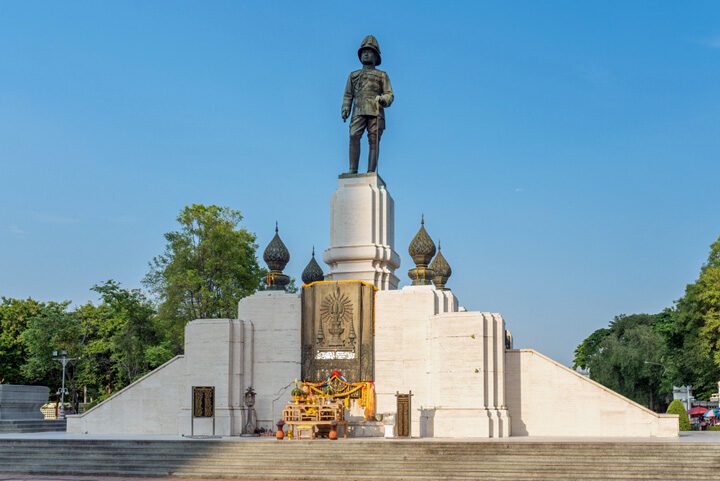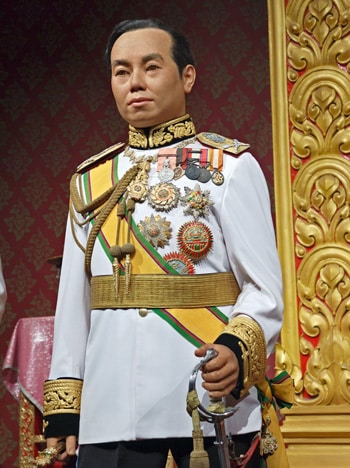
The statue of King Vajiravudh at Lumphini Park in Bangkok
When King Chulalongkorn died in 1910 after a reign of forty-two years, his eldest son, the twenty-nine-year-old Prince Vajiravudh, his undisputed successor.
The Prince had studied in England: military training at Sandhurst, law and history at Oxford. He took this mental baggage with him from Europe to Siam. As king, he took over absolute monarchy, in which military and civil administration were dominated by members of the very extensive (the late king had seventy-seven children!) royal family.
Two years after his coronation, Vajiravudh was confronted with a conspiracy: a group of young officers harbored ideas of a constitutional monarchy and even a partial republic. The group was rounded up and the danger was over. The king believed that Siam was far from ready to change the system of governance from an absolute to a constitutional monarchy, let alone a republic! He did, however, recognize that it was in the interests of the country to reduce the automatic lineage-based influence of the princes and to give more room to meritocratic tendencies.
Because he still wanted to experiment with other forms of government, the king founded a kind of testing ground for self-government in 1918: Dusit Thani, the Celestial City. This miniature city spanned almost half an acre in the palace gardens and incorporated all kinds of buildings on a small scale (1:15): private houses, palaces, temples and monuments, a clock tower, government buildings, barracks, shops, hospitals, a hotel, a bank, rivers and canals. There were also parks with fountains and waterfalls, a fire station and an electricity company. The king single-handedly wrote a constitution for the city. It had two hundred inhabitants, who had to choose their own board. The king founded two political parties: the Blues and the Reds, and he himself wanted to be regarded as a normal citizen like all other inhabitants.
He registered himself under the name Nai Ram na Krungthep, with a profession of lawyer. Dusit Thani also had two daily newspapers as well as a weekly, and these periodicals were of special interest to Nai Ram because he felt that the standards of Thai journalism in general needed improvement.
Dusit Thani's goal was to show how a democratic government functioned. Elections were held regularly to this end: in the first two years of Dusit Thani even seven times. That seems a bit much in a short time, but the king had come up with something very nice: not only space in Dusit Thani was reduced, but also time! The time in the experimental garden was reduced on a scale of 1:12. That meant that a month in Dusit Thani represented a whole year, and a day there represented 12 days. So the seven elections did not take place in two but in twenty-four years, and that is actually quite normal again.

King Vajiravudh
It is a very interesting question: is it really the case that if you reduce space, time also becomes smaller, that is to say faster? Or does time just get bigger, slower? Or is there no connection and it doesn't matter? Do people in small houses live faster than people in big houses? Does time go faster in Madurodam than in Amsterdam? Do small creatures, such as fruit flies and mice, live faster than large ones, such as elephants and whales? In general, the larger a living creature, the longer it lives, but that does not say anything about the speed at which people live. Let alone about the subjective feeling about it. Would a mouse think he lives fast, an elephant think he lives slowly? Does time move very fast for a one-hit wonder or extremely slow? 'When I was born the sun was there, now that I am old the sun is there. Nothing else has happened in my life!'
Tantalizing problem! I've just checked the standard work on the subject, namely Gulliver's Travels by Jonathan Swift, but that makes no mention of the fact that the speed of time among the dwarves in Lilliput differs from that of the giants in Brobdingnag. Even with Einstein, who is an undisputed authority on relative time, I am not getting any wiser about this. He did all sorts of thought experiments, but not about a greatly reduced or greatly enlarged universe and the position of the time dimension in it.
I'll just say that the king sped up time to allow frequent elections to be held in his laboratory, his pressure cooker of democracy, and he was, of course, quite right about that. These elections were always won by the candidate Nai Ram na Krungthep, because it was a democratic bridge too far for the Siamese to put someone else in power via the ballot box.
In 1924 the king died, only forty-four years old. Dusit Thani was dismantled after his death and disappeared from the face of the earth. His successor, his younger brother Prajadhipok, was forced to accept a constitution on June 24, 1932 in a non-violent coup d'état by a group of military and civilians, ending seven hundred years of absolute monarchy in Siam.
But that's a whole other story....


That 'testing ground for democracy' was a fun toy. In the many other writings left behind by Rama VI, he left no doubt that absolute monarchy (the king as 'father' and subjects as 'children') was the only proper form of government for Thailand.
I always want to know what those names mean. Names almost always have a meaning in Thai, usually of Sanskrit origin. ดุสิตธานี or Dusit Thani (doesit thaanie: show low low middle middle) means 'The Heavenly City'. Thani is city as in Udorn Thani and Surat Thani, Dusit is the (fourth) heaven.